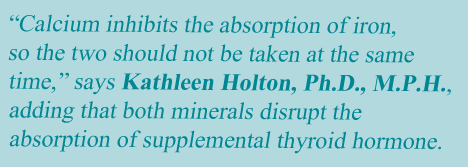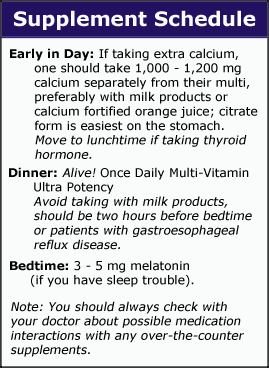Fibromyalgia Basics
Covering the Bases on Nutrition

Are the nutritional needs of fibromyalgia patients the same as healthy individuals? Studies often report that the pain or fatigue of fibromyalgia is more severe in patients with lower levels of certain vitamins and minerals. Yet low levels do not actually mean that patients are deficient, so how should you interpret these findings?
Kathleen Holton, Ph.D., M.P.H., of Oregon Health and Science University in Portland, points to infections and tissue injury after trauma as situations in which nutrients must be increased. But how fibromyalgia impacts the dietary needs of patients is unknown, so Holton offers some advice.
Hit or Miss
“When a study shows that fibromyalgia patients are deficient in a nutrient, let’s say a mineral, it encourages patients to take it,” says Holton. “Then patients end up ingesting higher amounts of that nutrient than their body may need, while not ensuring that they are getting the proper balance of nutrients that they need on a daily basis.”
“This is dangerous, and I don’t want to encourage people to take individual supplements like that.”
“You cannot just say that this vitamin or mineral helps with energy, so you can take it to relieve fatigue,” cautions Holton. “Our bodies don’t work that way.” There are lots of nutrients involved in the pathways that lead to energy production. So, supplementing with any one element that is considered to be important in helping your cells make energy probably won’t cut it.
“Sometimes fibromyalgia patients come in with a bag full of all the supplements that they are taking. Most of the time, they are taking these individual supplements because they have heard over the years that each one could be beneficial for fibromyalgia. Yet, they are seldom taking a multivitamin and mineral supplement.”
Holton does not recommend that fibromyalgia patients take supplements on a hit-or-miss basis “because it does not ensure good nutrition across the board. For the body to function properly, it requires multiple nutrients working together.”
A Better Balance

“Above all, I stress the importance of a healthy diet, but I also believe in using a multivitamin and mineral supplement as an insurance policy of sorts,” says Holton. “If you dose with one or two nutrients, it is very short-sighted because that is not how our bodies prefer to work.” Keep in mind, less than optimal levels of many other nutrients could also be adversely affecting your body’s metabolic processes. So, attempts to raise only one or two nutrients required for a process have a smaller likelihood of helping.
Rather than supplementing individual nutrients, Holton prefers to look at the other side of the spectrum. “I am interested in increasing levels of vitamins and minerals across the board to see if we can improve a person’s overall nutritional status.”
If you have searched for a good multi that contains everything you need, you probably noticed that they typically have lots of other ingredients. These special additives are often hyped as being wonderful for your health but lack a scientific basis and could irritate your system.
Finding a Multi
What should you look for in a multivitamin and mineral supplement? Holton says you should have a broad-spectrum with 100 percent of all the essential nutrients, and that includes iron. It’s okay to have elevated B vitamins and fruit/vegetable compounds that help with cell function.
You want to avoid additives and extra ingredients with questionable value because when taken daily, they could make symptoms worse. The multi needs to be suitable for vegetarians and people with common food allergies. Here is where selection can get tricky because you need to read the lengthy labels, and you have hundreds to select from.
A hassle-free option would be to use a multivitamin like Alive! Once Daily Multi-Vitamin Ultra Potency supplement—it’s what Holton recommends for her patients with fibromyalgia. A 60-day supply costs about $14, but keep in mind that you will save money by not having to buy individual supplements.
Iron and Vitamin B12
The thought of eating energy-rich foods that can help you push back daily fatigue sounds like many of the commercials on TV, but it’s just not practical. “A person can be eating an extremely healthy diet with adequate levels of all the nutrients, and they may still have fatigue due to other reasons,” says Holton. Hidden food allergies and digestive disorders can still leave people profoundly fatigued. But, if either iron or vitamin B12 is deficient, you most certainly will be dragging.
Iron deficiency anemia and pernicious anemia (low vitamin B12) can each be corrected by increasing dietary intake of these two nutrients. But don’t wait for these deficiencies to occur. Instead, guard against low iron and B12 by ensuring that your diet contains adequate amounts of each.
“The best source of iron and vitamin B12 is from red meat,” says Holton. “The iron in red meat is much more readily absorbed and used by the body than from any type of supplement. From a health perspective, try to select meat that is grass fed and as lean as possible.”
If you don’t consume meat, it is even more important to take a high quality multi supplement.
“There are vegetable sources of iron, like spinach, but the absorption of iron from plant sources is poor,” says Holton. “So, if you are a vegetarian, it’s imperative that you supplement with a multivitamin and mineral that contains 100 percent of your required iron and B12.”
Timing
Most people think of taking their vitamins and other supplements in the morning, but is this the ideal time?

- Multi at Dinner – “The best time to take a multivitamin is right after dinner on a full stomach,” says Holton. “This will maximize nutrient absorption and minimize stomach upset.”
- GI Matters – If you are prone to gastric reflux, you do not want to take your multi or food within two hours of bedtime. Fluids too late in the evening can also aggravate reflux. “High doses of individual nutrients may cause constipation, but this should not happen with the multi,” says Holton.
- Calcium – “Calcium inhibits the absorption of iron, so the two should not be taken at the same time,” says Holton. “This is why multivitamin and mineral supplements that contain 100 percent of your daily iron needs will be very low in calcium.” When taking your multi, it is best to avoid taking it with a glass of milk or other products loaded in calcium. Patients who want to ensure adequate calcium are better off taking this mineral earlier in the day, either with breakfast or lunch. The actual timing depends upon whether you are also on thyroid hormone supplementation.
- Thyroid Med – Not only does calcium interfere with the absorption of iron, but it also disrupts absorption of supplemental thyroid hormone, which must be taken first thing in the morning. In fact, neither calcium nor iron should be taken within four hours of thyroid. This means calcium supplementation and consumption of foods like milk, yogurt, cheese, and calcium fortified orange juice or cereal, should be postponed till lunchtime for anyone on thyroid hormone.
Exception
Consuming a diet rich in antioxidants is ideal for optimal health. For fibromyalgia patients with sleep disturbance, there is a special antioxidant that Holton recommends, which is not found in a multivitamin: melatonin. It crosses the blood-brain barrier to provide the brain with antioxidant protection. And if you are having sleep difficulties, taking melatonin at the same time each night can help strengthen your sleep cycle.
